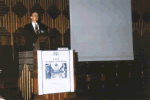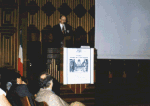 MEETING CONTINUING CHALLENGES IN THE PRACTICE OF FORENSIC TOXICOLOGY
MEETING CONTINUING CHALLENGES IN THE PRACTICE OF FORENSIC TOXICOLOGY
by
Logan B.K.
Washington State Toxicology Laboratory, 2203 Airport Way S., Seattle WA 98134, USA
Forensic toxicology has progressed to the point where some well-established analytical techniques are available for most of the commonly prescribed and abused drugs encountered in our populations. New analytical challenges continue to appear however, driven by factors like changes in drug fashions, and the development of novel biopharmaceutical agents.  The introduction of new techniques as capillary electrophoresis, and the development of affordable versions of existing technologies, such as benchtop liquid chromatography/mass spectrometry, will provide powerful new tools for the routine practice of forensic toxicology.
The introduction of new techniques as capillary electrophoresis, and the development of affordable versions of existing technologies, such as benchtop liquid chromatography/mass spectrometry, will provide powerful new tools for the routine practice of forensic toxicology.
In addition to the analytical challenges, equal or greater challenges lie in the interpretation of the results produced in our laboratories. This is true, not only relating to issues of human performance, but also to issues e.g. toxicity, drug interactions and the meaning of quantitative blood and tissue drug concentrations in death investigations. Simplistic interpretive strategies, assigning drug concentrations to therapeutic, toxic or fatal "bins", largely ignoring drug interactions, and treating the body as a single, static compartment, have increasingly been shown to be incomplete.  In this regard, developing and maintaining professional relationships with other disciplines, such as clinical medicine and toxicology, pharmacology, analytical chemistry, and forensic pathology and psychology, is important in researching the relationships between drug toxicity and cause and manner of death, and the development of more sophisticated interpretive strategies.
In this regard, developing and maintaining professional relationships with other disciplines, such as clinical medicine and toxicology, pharmacology, analytical chemistry, and forensic pathology and psychology, is important in researching the relationships between drug toxicity and cause and manner of death, and the development of more sophisticated interpretive strategies.
Finally, with greater public focus on the forensic sciences in general, greater regulation of our profession is inevitable and appropriate. Accreditation of personnel, certification of laboratories, increased documentation, and greater levels of quality control will significantly impact the way we practice our craft.
|